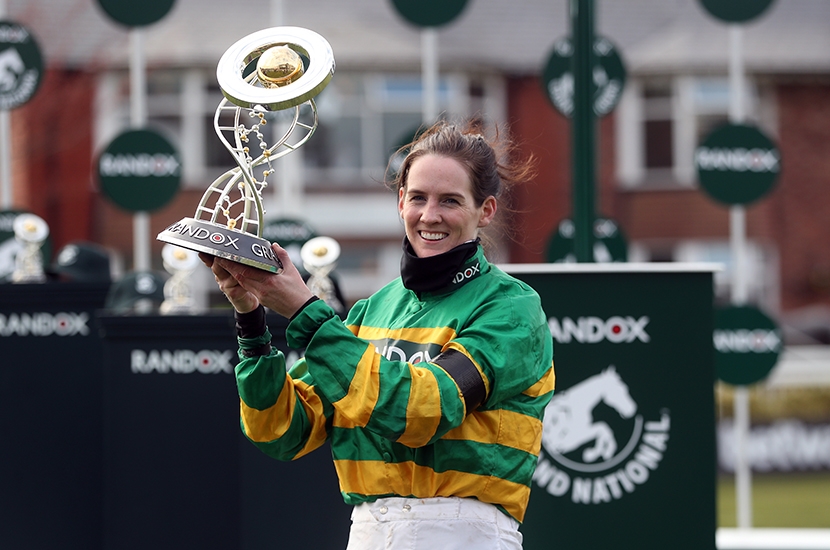Sporting heroes in our modern world have an extra burden to carry. Within seconds of their triumph, with the adrenaline still pumping, somebody is going to thrust a live microphone in their face and demand: ‘What does it feel like to have been the first person of Asian lineage to surmount six metres in the pole vault, to have been the first Lithuanian to have won the Sahara Rally, or the first transgender non-swimmer to have crossed the Channel in a self-propelled bathtub?’
It is the sort of ordeal that led former jockey Mick Fitzgerald, whose wise post-race analyses these days as a pundit are models of profundity, to declare after riding Rough Quest to victory in the Grand National that it had been ‘better than sex’, an instant response that left his lady of the time less than chuffed.
Red Rum’s trainer Ginger McCain declared that ‘Horses do not win Grand Nationals ridden by women’
The true answer for many asked such a question would probably be something like: ‘I feel totally bloody marvellous. Well done me,’ although there may be variants such as ‘I need a bloody good drink’ or ‘That’ll show the bastard who wouldn’t let me ride this horse last year’. But in the modern world and with the ghouls of social media in mind you have to show due humility and scramble through a mental checklist of those whom you should credit for aiding your success — the trainer, the stable lass, your racing mentors and Mum and Dad for ferrying you to and from those Pony Club meetings.
For Rachael Blackmore the ‘How does it feel?’ question is coming around with astonishing regularity. At the Cheltenham Festival she was the first woman to ride a Champion Hurdle winner and the first to be Festival champion jockey. Now, on Minella Times, she has become the first woman to win the Grand National, the gender breakthrough of all gender breakthroughs. Fortunately for racing, Blackmore has a natural grace that is up to any such occasion. ‘I don’t feel male or female right now. I don’t even feel human,’ she said, adding disarmingly: ‘At the moment I can’t believe I’m Rachael Blackmore.’
Perhaps it has helped that she has not come to prominence as a teenage sensation but is 31. The daughter of a dairy farmer and a teacher, she originally wanted to be a vet and holds a degree in animal medicine as well as a business studies diploma. First spotted by trainer ‘Shark’ Hanlon, she had only seven winners under Rules as an amateur and 11 in point-to-points when she turned professional in March 2015, becoming the first Irishwoman for 25 years to do so. Katie Walsh and Nina Carberry, Ireland’s two finest women riders before her, chose to spend their careers as amateurs. Rachael had no special connections to ease her route and has literally ridden her way to the top with her first Grade 1 success coming only in 2019.
The four falls which accompanied her Cheltenham glory underlined her toughness. Gigginstown’s Eddie O’Leary, who introduced her to her key ally Henry de Bromhead, says: ‘She has bigger balls than any of the boys.’ Her legitimate boxing-in of rivals in the Champion Hurdle and her waiting-in-front object lesson on Sir Gerhard in the bumper confirmed her tactical awareness and now she is, as the great Ruby Walsh insists, ‘the full package’.
The route she took in the Grand National, scraping the paint around the inner, used to be termed ‘the brave man’s route’. They’ll have to re-name that now and anybody who thinks that Rachael will have no further targets to aim at is getting her wrong: when she chose the wrong one of Henry de Bromhead’s pair A Plus Tard and finished second to his stablemate Minella Indo in the Gold Cup, Blackmore was the first to congratulate the winner but there was no doubt of her frustration. She will now be in pursuit, do not doubt, of that other coveted Cheltenham first.
Racing can rightly pride itself on being a sport in which men and women compete on equal terms, but it took a while. Only with the Sex Discrimination Act looming in the mid-1970s did the Jockey Club first permit women riders to compete against men in Flat races for amateurs and then finally over jumps. The first woman to ride in the National was Charlotte Brew on the 200-1 shot Barony Fort in 1977 when the pair cleared 26 of the 30 fences as Red Rum achieved his third victory.
In 1982 Geraldine Rees was the first woman to complete, finishing eighth and last on Cheers. Until Rachael Blackmore’s success, the best achievements by women riders were Katie Walsh’s third on Seabass in 2012 and the fifth places achieved by Carrie Ford, ten weeks after having a baby, on Forest Gunner (2005) and Bryony Frost on Milansbar (2018). Typically for his times, Red Rum’s trainer Ginger McCain declared of Carrie Ford’s participation: ‘Horses do not win Grand Nationals ridden by women’, earning her response that he was ‘a cantankerous old dinosaur’. Racing dinosaurs are definitely now extinct.






Comments